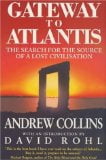 Gateway to Atlantis: The Search for the Source of a Lost Civilisation
Gateway to Atlantis: The Search for the Source of a Lost Civilisation
by Andrew Collins
Headline Book Publishing, £7.99, ISBN 0747261377
A search on Amazon.com brings up 170 titles on the subject of Atlantis. The Cincinnati Public Library has 67 including fiction and juvenile literature, and the Ohio library system lists 246 entries. Some of these will be duplicates, but clearly there is no dearth of books on the legendary lost continent of Atlantis.
Andrew Collins, author of Gateway to Atlantis, himself mentions millions of copies in print, not to mention movies and comics, and he seems to have read them all (pp. 16–17). Collins is aware “we are still awaiting an unambiguous archaeological discovery” (p. 16) and that “nothing has surfaced to confirm the Atlantis legend” (p. 17). Most scholars who know classical Greek literature deny that Atlantis represents a legend with an underlying core in reality. The only source on this lost civilisation is found in two essays of the philosopher Plato. Since a true legend would be mentioned more widely, experts consider Atlantis a fiction invented by Plato.
A few scholars have considered the explosion of the volcano Thera, midway between Crete, mainland Greece and Turkey in about 1500 BCE as possibly reflected in Plato’s fiction. Collins locates the lost civilization off the American Atlantic seaboard, on the shallow continental shelf. Here it disappeared beneath the sea when the glaciers melted at the end of the last ice age. This places the end of Atlantis in the period 12 to 20 thousand years ago. To archaeologists the latest among these dates coincides with the invention of agriculture. No remains of civilization, that is towns, writing, or metallurgy, have been found for this time period anywhere on earth.
Collins has a fair amount of interesting detail, but it becomes mind-numbing over four hundred pages. This is especially so when you have to plow through the first 150 pages before you find out just where he thinks Atlantis was located.


